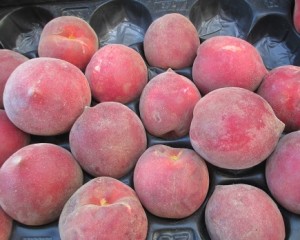Fears of Fruit Flood Ill-Informed Diets
Controversy swirls around the question of whether people who are overweight should eat fruit. On the one hand, this food is regarded as the embodiment of health, unprocessed and rich in vitamins, antioxidants, fiber, and other beneficial substances. But then there is the myth that, because fruit contains sugars, eating fruit will make you gain weight – or at least keep you from losing it.
The facts are totally in fruit’s favor, and evidence demolishes any theoretical concerns about its sugar content. Eating fruit is effective for weight loss. Studies show that people who eat more fruit tend to be thinner and don’t gain weight as readily.
The ridiculous myth that fruit should be avoided by dieters should not stop you from enjoying nature’s
bounty. Summer is an ideal time to eat all the fruit you want, and enjoy it. Popular choices such as peaches, nectarines, apricots, cherries, grapes, melons, strawberries, blueberries, raspberries, plums, pluots, kiwis, and many others fill stores and farmers markets.
SURPRISING FACTS
High quality, peer reviewed studies, published in reputable nutrition and medical journals, generally combine the impact of fruits and vegetables in studies of weight loss. However, research that does focus on fruit is promising.
One analysis is an overview of 16 other studies of the effect of eating fruit on weight. Eleven of these found that eating more fruit is associated with significant reductions in weight or less risk of gaining pounds over time. None of the studies found that eating fruit leads to weight gain.
A 2010 study in the journal Nutrition investigated how fruit consumption impacted weight loss in 77
overweight and obese dieters. The researchers confirmed that participants who ate more fruit were significantly thinner than the others and lost more weight. Vegetables, amazingly, did not have this impact on body mass index.
Another study found that research participants who consume a whole apple before lunch eat significantly less during that meal. Their total calorie intake goes down, even when the energy in the apple is added in with the calories in the meal. The lucky participants who eat the apple also feel fuller – they do not suffer hunger pangs.
Why does fruit spur weight loss and help prevent weight gain? Researchers give many answers, including the low caloric density of fruit (that is, because of its weight and water content, there are not many calories in a bite of a whole fruit, compared to a bite of many other foods). Other theories are related to the beneficial fiber in fruit and the amount of satisfaction from chewing fruit.
An interesting consideration is that studies show that eating dried fruit also has a beneficial impact on staying slim. Data from 13,292 people interviewed for the National Health and Nutrition Examination Study indicates that people who ate dried fruit every day have lower weight, body mass index, and
waist circumference than others who bypass dried fruit. But since most of water has been removed from dried fruit, this food has a higher calorie density than fresh or frozen fruit does. So what is the explanation?
Researchers don’t know the reason for sure, but an understanding of how your body works will give a good idea of why fruit is so helpful for weight loss. Your digestive system has sensors for both nutrients and calories, as well as stretch receptors. All three of these must be satisfied to turn off your hunger drive. You may overeat for many reasons, but one of the most fundamental – and overlooked – reasons is that your body is sending you out in a quest for more nutrients and (sometimes) calories. You experience this as a drive to eat.
While vegetables are super dense with nutrients, most have too few calories to turn off your calorie sensors. Fruit has an excellent combination of both thousands of nutrients and sufficient calories for your body to say “I just ate something.”
Fruit also satisfies the desire for great taste. Bakers and candy-makers try to copy fruit flavors, which are naturally appealing to people. However, real fruit satisfies the craving for delicious food naturally, so that you want fewer empty calorie, processed foods.
FRUITY TIPS
For maximum benefit and weight loss, follow these tips in selecting and eating fruit.
• Eat a variety of fruits for a superstar team. Each variety has its own nutritional profile. By choosing many kinds, you will get the most nutrition and appetite satisfaction
• Frozen fruits have just about all the nutrients in fresh fruits, and may be a convenient alternative
• For fresh fruit, concentrate on whatever is in season throughout the year. The seasonal fruit is more likely to be local and to have retained its just-picked flavor and nutrients
• Farmers markets and natural food stores may have tastier, juicier fruit than most supermarkets do. If you are not thrilled by supermarket quality fruit, definitely seek out alternative sources
• Fruit is more satiating when eaten slowly and chewed thoroughly
• There is no need to further sweeten already naturally tasty fruit
• Fruit is highly portable, so it’s an excellent snack wherever you are
Eating a varied, whole foods, plant-based diet is a key to weight loss. Fruit is an integral – and delicious – part of this optimal pattern of food choices.
If you enjoyed this post, you may want to read this post on how to make a fruit salad that everyone will love.
Intrigued? Now you can use our Whole Foods Blog Finder to target informative, fun postings on whole foods, plant-based diets. Quick information at no cost!
Blog posting by Janice Stanger, Ph.D. Janice authored The Perfect Formula Diet: How to Lose Weight and Get Healthy Now With Six Kinds of Whole Foods, a book that shows you how to thrive and stay slim with whole plant foods. Janice is pleased to be a regular contributor to VegWorld Magazine, and this post was written as an article for VegWorld.
Tags: antioxidants, fruit, fruit and weight loss, fruit salad, lose weight, nutrition facts, Perfect Formula Diet, Plant-based nutrition, summer fruits, weight loss, whole foods plant-based diet









